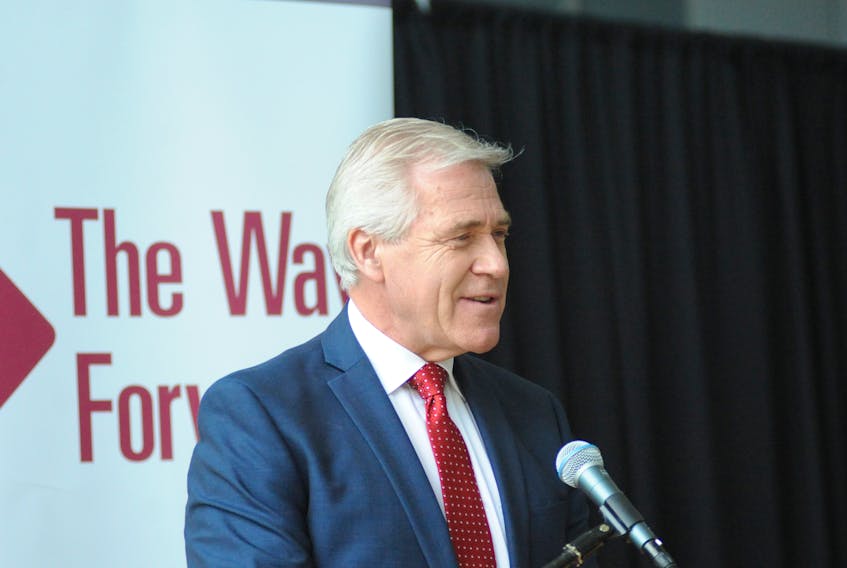SASKATOON, Sask. — Council of the Federation meetings in Saskatoon, Sask., wrapped up Thursday with a unified message on pharmacare.
Newfoundland and Labrador Premier Dwight Ball, who led the discussion on pharmacare, told SaltWire that all provinces reaffirmed their shared commitment to a national pharmacare plan.
“There was a consensus among all 13 premiers to press the federal government, and to make this an election issue and priority going into the fall federal election,” Ball said.
Ball said the premiers discussed the struggle many Canadians face to afford medication, and how coverage can vary between provinces.
“We're the only country in the G7 that doesn’t have a national pharmacare program. … It’s about affordability, it's about accessibility and it’s about making sure we have (equality) across the country.”
Speaking with SaltWire, Nova Scotia Premier Stephen McNeil said the premiers also discussed health-care delivery and agreed Ottawa needs to take a more active role in health-care funding.
“If you go back and look, at one point the federal government covered about 25 per cent of the health-care costs in our provinces, and in many jurisdictions, it’s now below 20 and as low as 18,” McNeil said. “We believe the federal government needs to enhance its investment.”
P.E.I. Premier Dennis King said one of the major products of this week’s meeting was a commitment by all premiers to lead a national mental-health and addictions symposium in the coming year.
“Northern premiers have been leading a discussion for the council based around improving how provinces deliver mental health and addictions,” King said. “In order to give this the seriousness that it needs to get and the attention it needs to get, we thought that the premiers could lead a national symposium bringing not just the provinces but all of the players in the industry to develop a real comprehensive strategy going forward for how we deal with mental health and addictions that impact every community.”
Details of the symposium have yet to be determined, but it’s likely to be held in Ottawa.
As it was his first Council of the Federation meeting, King said it was important to underline P.E.I.’s commitment to aggressive climate change targets.
“P.E.I. has chosen not to fight like some of the other provinces, but to embrace the low carbon program that has been put forward by the federal government with the hopes of trying to do what everyone wants us to do in P.E.I., which is reduce carbon,” he said.
The four Atlantic premiers also met as a group, where they recommitted to strengthening the energy corridor in the region, McNeil said.
“In our system right now there are bottlenecks where we can’t bring energy in or get it out. For example, there’s a bottleneck both at the New Brunswick and Quebec border, there’s one at the Nova Scotia and New Brunswick border,” McNeil said. “We want to be able to open that up so that we can bring in Newfoundland and Labrador hydro and send it out into New Brunswick and other parts of Atlantic Canada and beyond … which allows us to continue to reduce our carbon footprint in the region.”
Despite the fact that the region’s premiers recently went from four Liberal to two Tory and two Liberal governments, McNeil said there’s been no major change in dynamic with how the four provinces work together.
“Many of our problems are the same: aging population, health-care costs, decaying infrastructure, economic development and how do we turn the demographic change around,” he said. “Those are all things that, regardless of if you’re a Conservative or Liberal or NDP or Green in Atlantic Canada, you know we have to deal with.”
One change that raised concerns from Ball, however, was the lack of female representation at the table.
“It’s very obvious when you step in the room you've got 13 male premiers and when I joined the table just over three years ago we had three very strong female voices,” Ball said.
“I think that’s a loss not just for the Council of the Federation, but for Canadians in general. We need strong women in leadership roles within our provinces.”
There were no federal officials or federal party leaders at this week’s meetings, but McNeil said the provinces have agreed to jointly contact all leaders and ask where they stand on certain important issues to the provinces, such as health care, economic development and national pharmacare, and what their version of the federation looks like.
@notandrea









